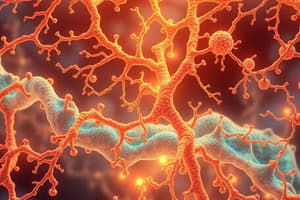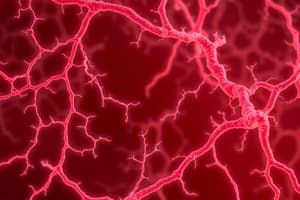Podcast
Questions and Answers
What is the primary function of connective tissue?
What is the primary function of connective tissue?
- To produce hormones
- To transport nutrients
- To support and connect different tissues and organs (correct)
- To facilitate communication between cells
Which component is responsible for the tensile strength of connective tissue?
Which component is responsible for the tensile strength of connective tissue?
- Proteoglycans
- Collagen fibers (correct)
- Elastic fibers
- Glycosaminoglycans
Which cell type is NOT typically associated with connective tissue?
Which cell type is NOT typically associated with connective tissue?
- Adipocytes
- Neurons (correct)
- Fibroblasts
- Macrophages
What provides elasticity to connective tissue, allowing it to return to its original shape after distortion?
What provides elasticity to connective tissue, allowing it to return to its original shape after distortion?
How many different types of collagen are known to exist?
How many different types of collagen are known to exist?
What substance in the extracellular matrix provides volume to connective tissue?
What substance in the extracellular matrix provides volume to connective tissue?
Which type of connective tissue serves as biological packing material?
Which type of connective tissue serves as biological packing material?
What is the primary source of collagen in the extracellular matrix?
What is the primary source of collagen in the extracellular matrix?
What is the primary function of loose connective tissue?
What is the primary function of loose connective tissue?
Which type of connective tissue has a high amount of collagen and little ground substance?
Which type of connective tissue has a high amount of collagen and little ground substance?
Which of the following is an example of loose connective tissue?
Which of the following is an example of loose connective tissue?
What is the main characteristic of dense irregular connective tissue?
What is the main characteristic of dense irregular connective tissue?
What type of connective tissue provides structural support and protection to organs?
What type of connective tissue provides structural support and protection to organs?
Fibroblasts in connective tissue are primarily responsible for producing what?
Fibroblasts in connective tissue are primarily responsible for producing what?
What is the primary role of collagen fibers in connective tissue?
What is the primary role of collagen fibers in connective tissue?
Which statement regarding dense regular connective tissue is true?
Which statement regarding dense regular connective tissue is true?
What is the primary role of elastic fibers in connective tissues?
What is the primary role of elastic fibers in connective tissues?
Which macromolecule is NOT a component of the ground substance?
Which macromolecule is NOT a component of the ground substance?
What is the most predominant glycosaminoglycan found in the ground substance?
What is the most predominant glycosaminoglycan found in the ground substance?
Which cell type is crucial for the secretion and maintenance of the extracellular matrix?
Which cell type is crucial for the secretion and maintenance of the extracellular matrix?
What characteristic distinguishes loose connective tissue from dense connective tissue?
What characteristic distinguishes loose connective tissue from dense connective tissue?
What is the main function of white adipose tissue?
What is the main function of white adipose tissue?
Which of the following statements about brown adipose tissue is true?
Which of the following statements about brown adipose tissue is true?
Which enzyme is responsible for breaking down elastic fibers?
Which enzyme is responsible for breaking down elastic fibers?
What is the primary component of multiadhesive glycoproteins?
What is the primary component of multiadhesive glycoproteins?
What type of connective tissue has a high degree of hydration and serves as a lubricant?
What type of connective tissue has a high degree of hydration and serves as a lubricant?
Flashcards are hidden until you start studying
Study Notes
Connective Tissue Basics
- Connective tissue provides a matrix that supports and connects tissues and cells, forming organs.
- Originates from embryonic mesenchyme.
- Provides tensile strength (resistance to pulling, stretching, and tearing) due to collagen.
- Provides elasticity (ability to return to original shape after distortion) due to elastic fibers.
- Provides volume and substance due to ground substance.
Extracellular Matrix
- Consists of protein fibers and ground substance.
- Protein fibers
- Collagen: Provides tensile strength, most abundant protein in the body.
- Elastin: Provides elasticity and allows tissues to stretch and return to their original shape.
- Ground substance
- Glycosaminoglycans (GAGs): Long polymers of repeating disaccharide units. Hyaluronan is the most predominant and plays a role in molecular diffusion and lubrication.
- Proteoglycans: Core protein with bound GAGs, associate with collagen fibers and other ECM components.
- Multiadhesive glycoproteins: Cell adhesion, have multiple binding sites for cell surface integrins and other matrix molecules.
Cells of Connective Tissue
- Derived from mesenchyme.
- Fibroblasts: Key cell in connective tissue, secretes, maintains, and recycles the matrix.
- Adipocytes: Main cell in fat tissue, supports and stores triglycerides and participates in metabolism.
- Macrophages: Phagocytic cells involved in immune response.
- Mast cells: Secrete histamine, heparin, and other inflammatory mediators.
- White blood cells: Migrate to connective tissue to fight infection.
Types of Connective Tissue
- Loose connective tissue: Acts as biologic packing and wrapping material, supports microvasculature, nerves, and immune defense cells. Examples include lamina propria in the digestive tract.
- Dense connective tissue: Provides physical support. Includes cartilage and bone, specialized forms of dense connective tissue.
- Dense Irregular: Little ground substance, few cells, much collagen in randomly arranged fibers. Provides protection and support to organs. Examples include dermis of skin, organ capsules, submucosa layer of digestive tract.
- Dense Regular: Almost completely filled with parallel bundles of collagen, fewer fibroblasts, aligned with collagen. Provides strong connections within the musculoskeletal system. Examples include ligaments, tendons, aponeuroses, corneal stroma.
Studying That Suits You
Use AI to generate personalized quizzes and flashcards to suit your learning preferences.




